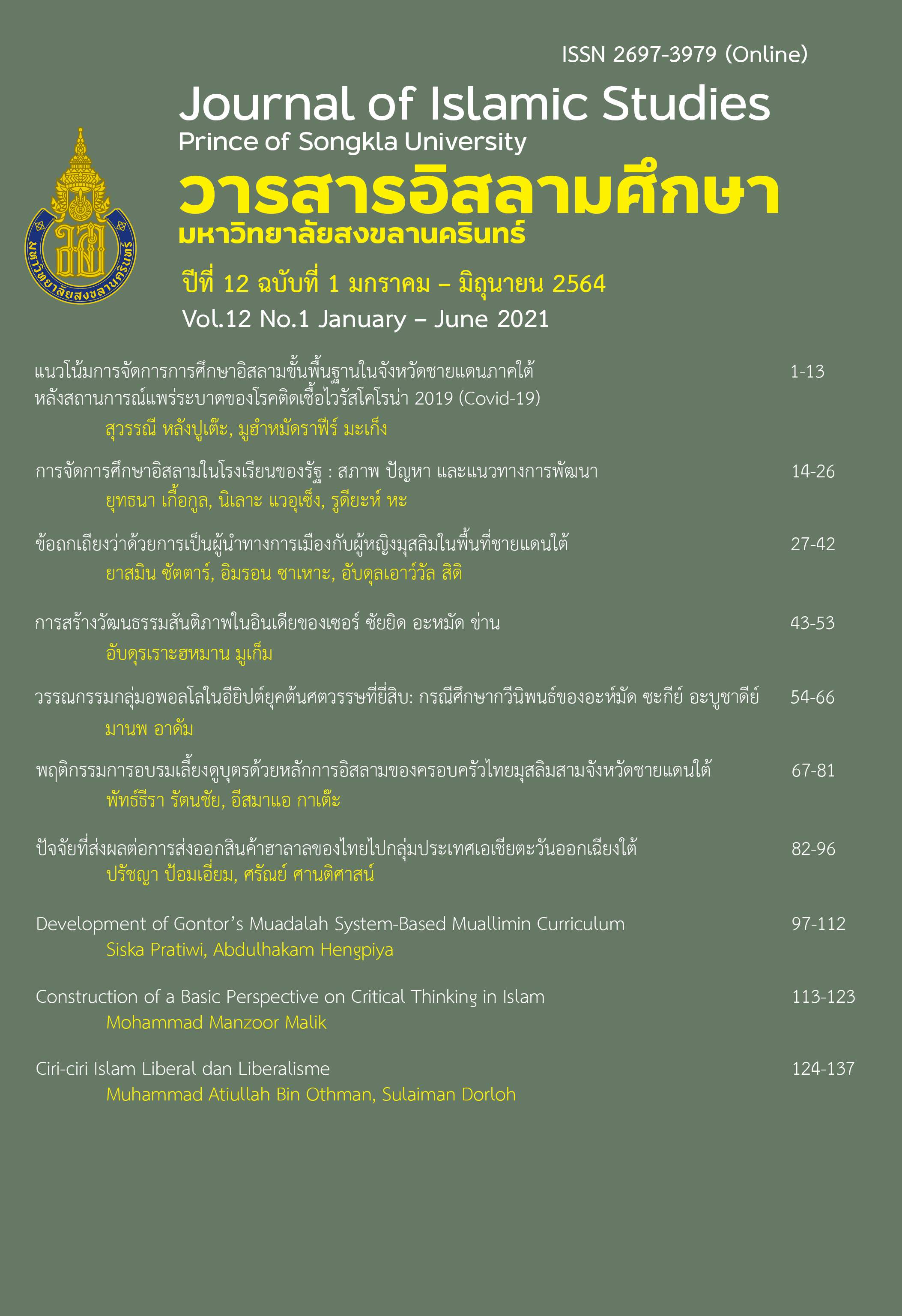Building Peace Culture in India of Sir, Syed Ahmad Khan
Keywords:
Sir Syed Ahmad Khan, Peace Culture, IndiaAbstract
Objective This research paper aims to study Sir, Syed Ahmad Khan’s thought in building peace culture in pluralistic society in India, through the main question is, how Sir Syed Ahmad Khan solve the conflict in pluralistic society in India?
Methodology The researcher collected academic data from different sources, Thai and foreign to find out Sir, Syed’s thought in building peace culture. And interviewed key informants ten of Thai academic scholars, who expert about government and politics, society, culture and Indian philosophers.
Research Findings 1) Sir Syed Ahmad Khan presented his thoughts and approaches of building peace culture through inter-cultural learning cross cultures, 2) two eyes of India, 3) Quam and,
4) Indian secularism for reconciliation between Hindu and Muslim.
Applications Sir Syed Ahmad Khan’s thoughts can be applied in building peace culture in pluralistic society, due to it gave lesson of successful in solving conflict resolution in Indian society. Thai society should also learn it as an approach of solving going on conflict resolution.
References
Ahmad, A. (2006). Sir Syed Ahmad Khan on Education. Aligarh Muslim University Press.
Bhagwan, V. (1999). Indian Political Thinkers. Atma Ram and Sons.
Gandhi, R. (2000). Understanding Muslim Mind. Penguin.
Government of India. (1951). University Education Commission Report (1948-1949). Minister of Education.
Guha, R. (2012). Makers of Modern India. Penguin.
Husain, I. (2004). “Sir Syed’s Perception of Islam.” In Abdul Ali and Syed Ahsan (Eds.), Contribution of Sir Syed Ahmad Khan to Islamic Studies (pp. 94-109). Aligarh Muslim University Press.
Khan, G. A. (2004). Sir Syed Ahmad Khan and Maulana Muhammad Qasim Nanautavi: Educational Views. In Abdul Ali and Syed Ahsan (Eds.), Contribution of Sir Syed Ahmad Khan to Islamic Studies (pp. 149-170). Aligarh Muslim University Press.
Khan, S. A. (2007). History of the *Bijnor* Rebellion (1858). (Translated by Hafeez Malik and Morris Dembo). http://www.columbia.edu/itc/mealac/pritchett/00urdu/asbab/bijnor/index.html
Michel, T. (2001). On Building a Culture of Peace. In Mucha-Shim Arquiza and M. Abdus Sabur (Eds.), Interfaith Conference on the Culture of Peace: Celebrating A.M.A.N.’s Ten Years of Relevance in International Solidarity,Networking and Peace-Work (pp. 42-53.). Asian Muslim Action Network.
Mukem, A. (2015). Sir Syed Ahmad Khan (1817-1898): Transition of violence to education system.
Walailak Journal of Social Science, 8(1), 35-61. https://so06.tci-thaijo.org/index.php/wjss/article/view/94579/73948
Nizami, K. A. (1991). Secular Tradition at the Aligarh Muslim University. Aligarh
Muslim University Press.
Qasmi, A. (2005). Political Intellectualism Versus Muslim Reformers: Shah Waliullah and Sir Syed Ahmad Khan. In Abdul Ali and Syed Ahsa (Eds.), Contribution of Sir Syed Ahmad Khan to Islamic Studies (pp. 134-148). Aligarh Muslim University Press.
United Nations. (1999). Resolution adopted by the General Assembly: 53/243 A. Declaration on a
Culture of Peace. September 13, 1999.
Downloads
Published
How to Cite
Issue
Section
License
Copyright (c) 2021 Journal of Islamic Studies, Prince of Songkla University

This work is licensed under a Creative Commons Attribution 4.0 International License.
All articles Published in The Journal of Islamic Studies are author’s opinions, and not the responsibility of the Faculty of Islamic Sciences nor the editorial board. However any citation should be referred to the journal.
















